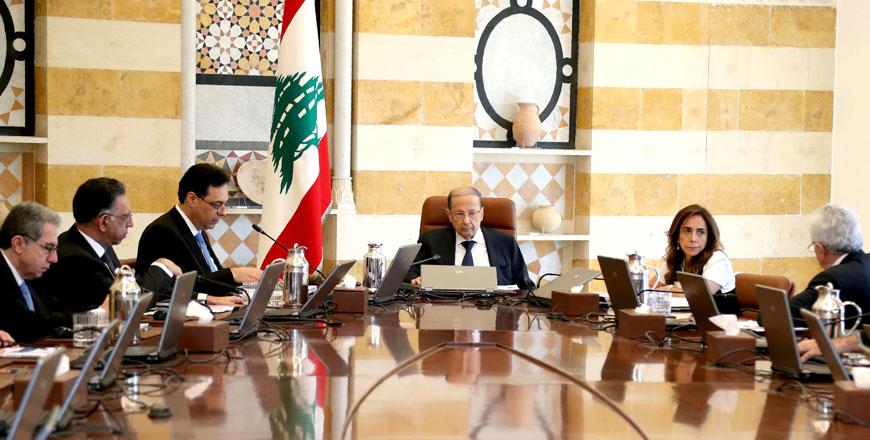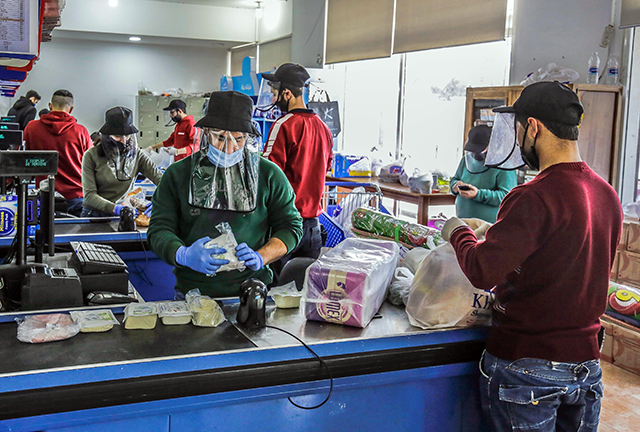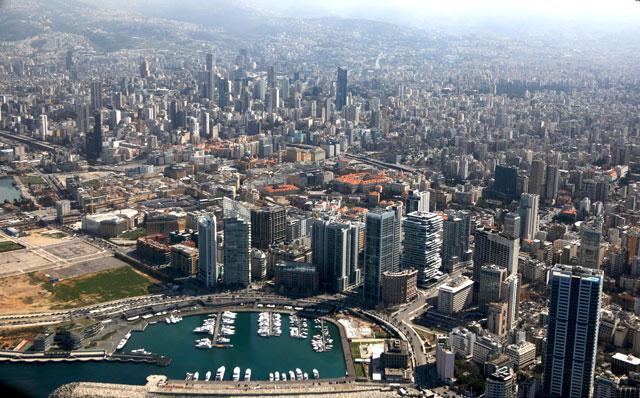You are here
Crisis-hit Lebanon to default on its Eurobond debt
By AFP - Mar 08,2020 - Last updated at Mar 08,2020

Lebanon's President Michel Aoun (centre) heading a ministerial council at the presidential palace in Baabda, east of the capital Beirut, on Saturday (AFP photo)
BEIRUT — Lebanon said on Saturday it would default on its Eurobond debt for the first time and seek out debt restructuring agreements amid a spiralling financial crisis that has hit foreign reserves.
Foreign currency reserves have fallen to "a worrying and dangerous level which pushes the Lebanese government to suspend payment of the March 9 Eurobond maturity because of a need for these funds", Prime Minister Hassan Diab said in an address to the nation.
"The Lebanese state will seek to restructure its debts," added Diab, whose self-styled government of technocrats was formed in January to tackle an intensifying financial crisis amid unprecedented protests.
The country has been going through a severe liquidity crunch and months of anti-government protests.
On Saturday, the government was due to decide whether to repay a $1.2-billion Eurobond maturing on March 9.
The president, prime minister and senior finance officials "agreed to support the government in any decision regarding debt management, with the exception of a payment of debt maturities", the presidency had said in a statement.
Lebanon's debt burden, long among the largest in the world, is now equivalent to nearly 170 per cent of its gross domestic product.
Despite a series of crisis, the country has never before defaulted, but in recent months it has grappled with its worst economic turmoil since the 1975-1990 civil war.
Foreign currency inflows have slowed, Lebanon's pound has plunged and banks have imposed tough restrictions on dollar withdrawals and transfers.
According to Marwan Barakat, head of research at Bank Audi, Lebanese banks owned $12.7 billion of the country's outstanding 30 billion Eurobonds as of the end of January.
The central bank held $5.7 billion and the remaining were owned by foreign creditors, he said.
According to local media reports, Lebanese banks have recently sold a chunk of their Eurobonds to foreign lenders.
Local banks, which own a chunk of the Eurobonds maturing on March 9, have argued against a default, saying it would pile added pressure on a cash-strapped banking sector and compromise Lebanon's ties with foreign creditors.
Lawmakers, most notably those representing the Shiite Amal and Hizbollah movements, have advocated debt restructuring to preserve plummeting foreign currency reserves.
Debt restructuring
Anti-government demonstrators who have remained on the streets since October have also lobbied against repayment, fearing a depletion of reserves could further limit access to their savings.
"We shouldn't have to pay the price of government shortcomings," said Nour, a 16-year-old demonstrator, during a rally outside central bank headquarters in Beirut.
Lebanon's sovereign debt rating slid into junk territory long ago, but investor confidence has fallen further since the mass protests erupted.
Credit rating agencies have warned of further downgrades in the event of a default, but economists have stressed the need to protect Lebanon's foreign currency reserves.
Jad Chaaban, an economics professor at the American University of Beirut, blamed the political class for Lebanon's predicament, accusing them of decades of corruption.
"This 'catastrophe' or 'fireball' is the creation of a failed and criminal political class that has lied and robbed for more than 30 years," he said on Facebook.
He called on officials to restructure the debt and introduce an economic rescue plan that would protect modest depositors.
Diab met last month with a delegation from the International Monetary Fund (IMF) to discuss how to tackle the country's spiralling economic crisis.
The premier asked the Washington-based crisis lender for advice, but has yet to ask for financial assistance.
Barakat at Bank Audi said IMF assistance was necessary.
"Lebanon needs first and foremost an imminent debt restructuring plan within the context of a comprehensive plan for debt management," he told AFP.
"The best is to have such a plan under the umbrella of the IMF for international financial assistance to materialise."
The Lebanese pound, which has been pegged to the dollar since 1997, has plummeted on the parallel market, amid soaring inflation and unemployment.
The World Bank has warned of an impeding recession that may see poverty rates rise drastically.
Related Articles
BEIRUT — Lebanon's finance ministry on Monday said it will "discontinue" payments on all dollar-denominated Eurobonds due in the next 15 yea
BEIRUT — Lebanon, shaken by street protests and economic crisis and now set to default on its Eurobond debt, has pledged reforms that will s
Ukraine's new energy minister pleaded with industrial and domestic consumers to use less electricity as hard frosts led to a sharp drop in gas stocks and low coal stockpiles, making more blackouts likely.


















